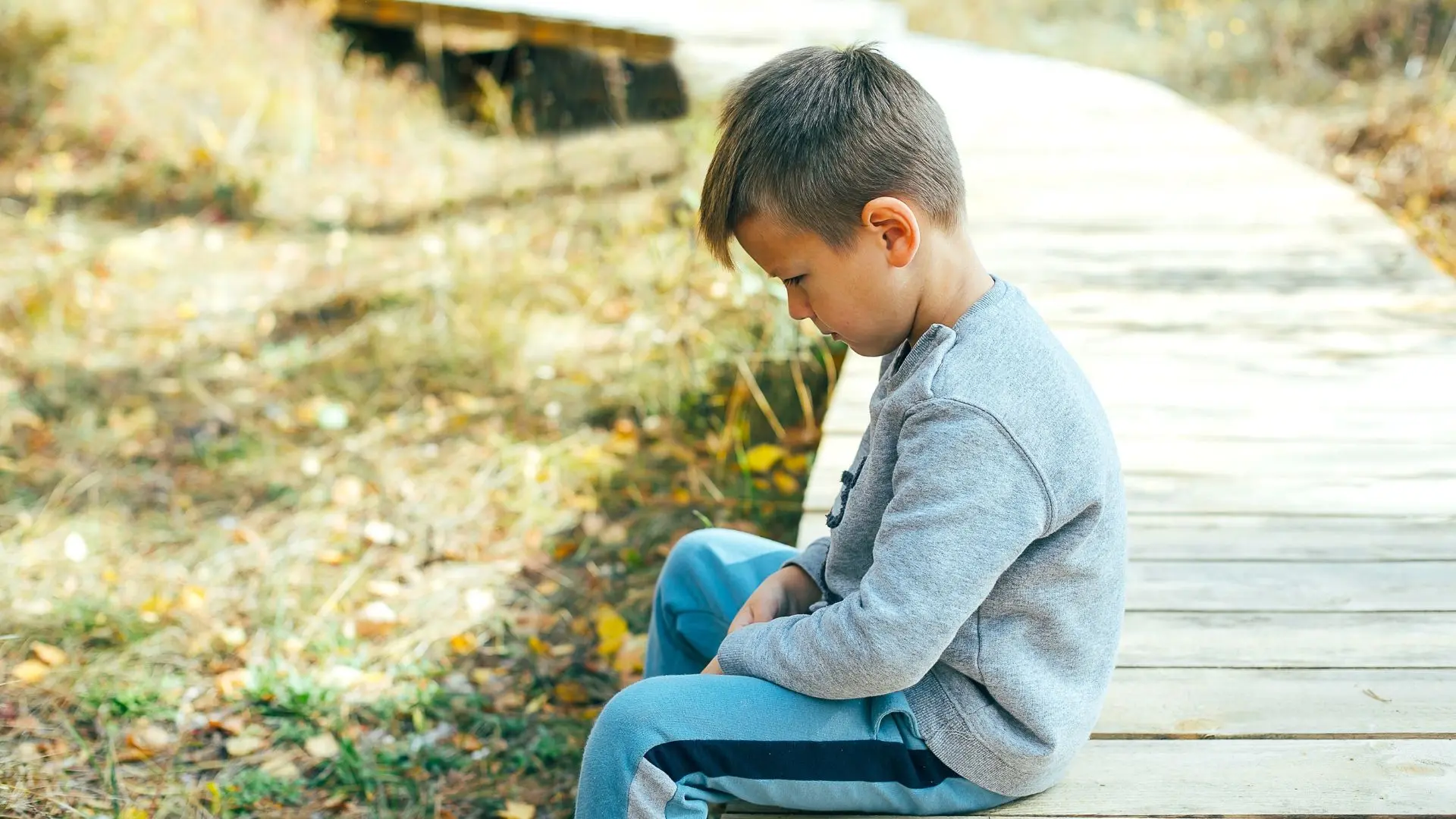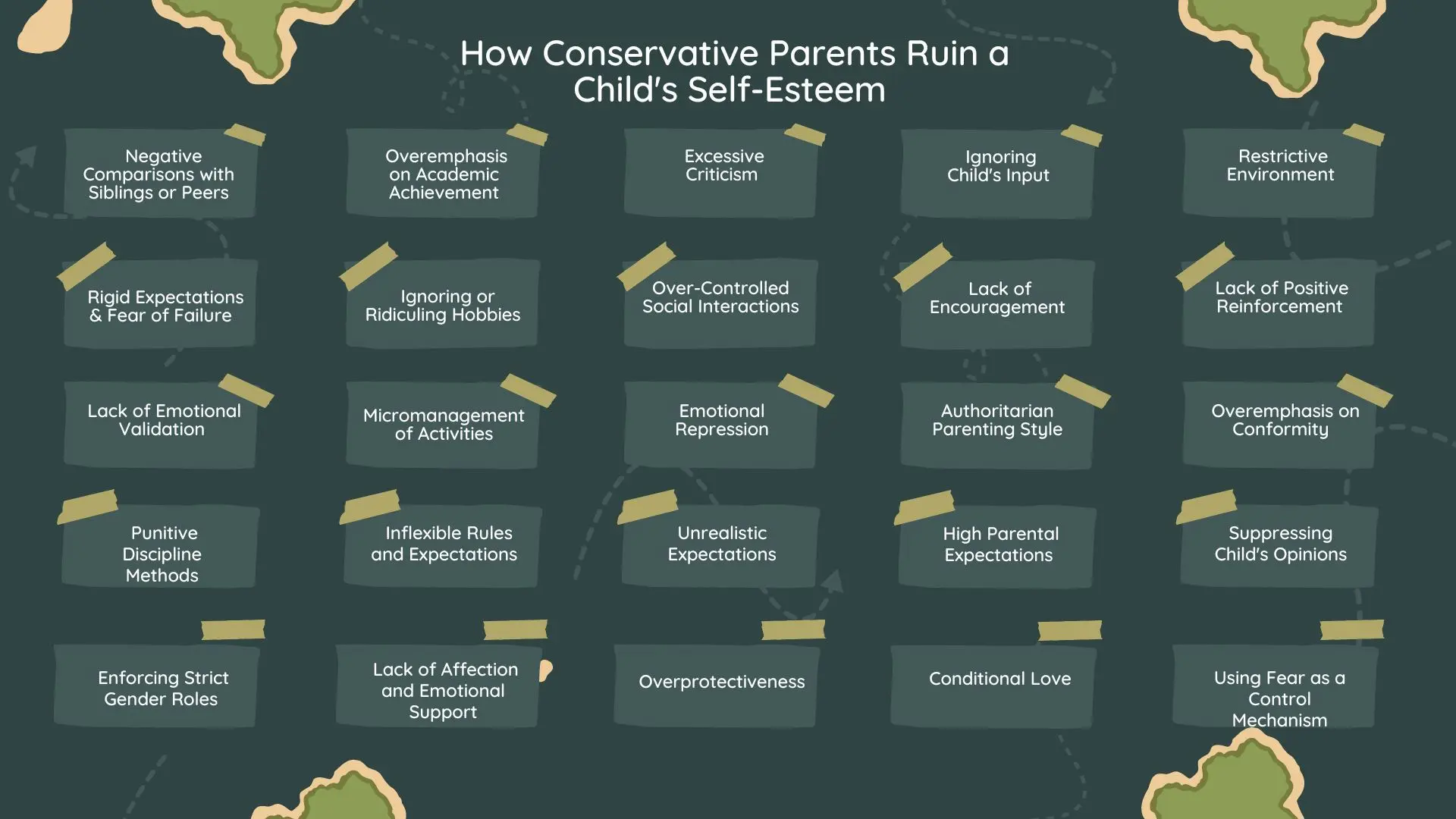Discover how Conservative parents influence and ruin a child’s self-esteem. Gain insights into what not to do as parents to nurture a healthy, and confident individual.

decision, every word spoken, holds the potential to shape not just our children’s achievements, but their fundamental belief in themselves. Together, let’s uncover the truths behind the façade of discipline and tradition, and discover pathways to cultivate resilience and authentic self-esteem in our children.
25 Ways, How Conservative Parents Ruin a Child’s Self-Esteem

1. Excessive Criticism and Unrealistic Expectations
Conservative Parents often place high expectations on their children, aiming for excellence in every aspect of their lives. While striving for the best is admirable, the approach can inadvertently lead to excessive criticism. Imagine a scenario where a child brings home a good grade on a test. Instead of celebrating their achievement, a Conservative Parent might focus on the few mistakes made, pushing the child to do better next time. This constant emphasis on flaws rather than strengths can chip away at a child’s confidence, fostering a belief that they are never good enough.
2. Lack of Emotional Validation and Support
Children crave emotional validation and support from their parents. In the hustle and bustle of life, however, Conservative Parents may prioritize discipline and obedience over emotional connection. When a child expresses sadness or frustration, they may hear phrases like, “Stop crying, you’re fine,” or “Toughen up, don’t be so sensitive.” This lack of emotional validation can leave children feeling misunderstood and lonely, believing that their feelings are not valid. Over time, they may internalize these emotions, affecting their self-esteem and emotional well-being.
3. Create Fear of Failure
Conservative Parents often adopt an authoritarian parenting style, characterized by strict rules and consequences for disobedience. While structure is important, an overly rigid approach can create a fear of failure in children. Picture a teenager who dreams of pursuing art but is pressured by their parents to focus solely on academics for a “secure future.” This fear of not meeting expectations or facing harsh consequences can stifle creativity and personal growth, leaving children feeling inadequate and insecure about their abilities.

4. Overemphasis on Perfectionism
Perfectionism is another trait commonly associated with Conservative Parents. They may expect their children to excel in academics, sports, and extracurricular activities without room for mistakes. While striving for excellence is commendable, the relentless pursuit of perfection can lead to anxiety and self-doubt in children. They may develop a fixed mindset, believing that their worth is tied to their achievements rather than their inherent qualities and efforts.
5. Negative Comparisons with Siblings or Peers
Making comparisons, whether deliberate or inadvertent, can significantly harm a child’s sense of self-worth. Conservative Parents may unknowingly compare their children to siblings, friends, or even their own achievements at the same age. ” “Why don’t you try to be like your sister?” or “Look at how well Johnny is doing in school.” Such comparisons can breed resentment and a sense of inadequacy in children, making them feel unappreciated and unvalued for who they are.
6. Punitive Discipline Methods
Discipline is essential for guiding children’s behavior, but the methods used can greatly impact their self-esteem. Conservative Parents may resort to punitive measures such as yelling, spanking, or grounding as consequences for misbehavior. While these tactics may temporarily stop unwanted behavior, they can also instill fear and shame in children. Instead of learning from their mistakes, children may internalize negative beliefs about themselves, affecting their self-worth and relationship with authority figures.
7. Suppression of Individuality and Interests
Each child possesses their own set of talents, interests, and aspirations, making them uniquely individual. However, Conservative Parents may inadvertently suppress their child’s individuality in favor of conformity. They might discourage unconventional interests or career paths, believing that traditional routes are safer or more respectable. This suppression can lead children to doubt their own passions and abilities, fearing rejection or disapproval from their parents.
8. Lack of Encouragement for Creative Expression
Creative expression is vital for children to explore their imagination, emotions, and talents. Yet, Conservative Parents may prioritize practical skills or academic achievements over artistic pursuits. They may dismiss creative endeavors as mere hobbies rather than valuable forms of self-expression. Without encouragement and support for their creative endeavors, children may feel unfulfilled and restrained in expressing their true selves.
9. Overcontrolling and Micromanaging Behavior
Helicopter parenting is a term often used to describe Conservative Parents who hover over every aspect of their child’s life. From scheduling activities to micromanaging homework, these parents may not realize the detrimental impact of their overcontrolling behavior. Constant supervision can convey a lack of trust in their child’s abilities, hindering their development of independence and self-confidence. Children may become overly reliant on parental guidance, fearing making decisions or taking risks on their own.
10. Dismissal of Child’s Achievements and Milestones
Acknowledging and celebrating children’s achievements, no matter how small, is crucial for building their self-esteem. However, Conservative Parents may downplay or dismiss their child’s accomplishments as expected or insignificant. “Getting good grades is your duty, not something to brag about,” they might say. This dismissal can make children feel unappreciated and unmotivated to strive for excellence, as their efforts go unnoticed or unacknowledged.
11. Imposing Rigid Gender Roles
Gender stereotypes and roles can limit children’s self-expression and personal development. Conservative Parents may adhere strictly to traditional gender norms, expecting boys to be tough and assertive while girls should be nurturing and submissive. This binary view can restrict children from exploring diverse interests or expressing their true identities. It can also lead to internalized beliefs about gender roles, affecting their self-esteem and relationships as they grow older.
12. Ignoring or Minimizing Child’s Opinions
Listening to and respecting children’s opinions is fundamental to nurturing their self-esteem and autonomy. However, Conservative Parents may dismiss or minimize their child’s viewpoints, believing that parental wisdom should prevail. They might say, “You’re too young to understand,” or “Just do as I say.” This dismissal can leave children feeling unheard and insignificant, eroding their confidence in expressing their thoughts and making decisions independently.
13. Enforcing Strict Social and Cultural Norms
Social and cultural norms shape our beliefs and behaviors, but they can also constrain children’s growth and self-expression. Conservative Parents may prioritize conformity to societal expectations, discouraging behaviors or beliefs that deviate from the norm. This adherence can limit children’s exploration of diverse perspectives or identities, making them feel pressured to fit into predefined molds rather than embrace their true selves.
14. Lack of Affection and Positive Reinforcement
Affection and positive reinforcement are essential for fostering a secure attachment and building children’s self-esteem. However, Conservative Parents may struggle to express love or praise openly, believing that discipline and structure are more important. They might withhold affection as a form of discipline or reserve praise for exceptional achievements only. This lack of emotional warmth can leave children feeling unloved or undeserving of affection, impacting their self-worth and emotional well-being.
15. Encouraging Dependence and Discouraging Independence
Independence is a vital skill for children to develop as they grow older, yet Conservative Parents may inadvertently foster dependence on parental guidance or approval. They may hesitate to let go of control, fearing that their child might make mistakes or face challenges on their own. This overprotective stance can hinder children’s self-reliance and decision-making skills, leaving them uncertain and hesitant to navigate life’s challenges independently.
16. Failure to Acknowledge and Address the Child’s Emotional Needs
Emotional needs are as important as physical needs for children’s overall well-being. However, Conservative Parents may focus primarily on tangible needs like food, shelter, and education, neglecting their child’s emotional health. They may overlook signs of distress or sadness, dismissing them as temporary or unimportant. This oversight can lead to unresolved emotional issues, affecting children’s self-esteem and ability to manage stress or adversity in the future.
17. Undermining Child’s Confidence in Decision-Making
Confidence in decision-making is a skill that develops through practice and support from parents. However, Conservative Parents may undermine their children’s confidence by second-guessing their choices or imposing their own preferences. They may say, “You’re too young to decide,” or “Let me decide what’s best for you.” This undermining can diminish children’s self-trust and assertiveness, making them doubt their abilities to make informed decisions independently.
18. Promoting a Fear-Based Environment
Fear is a powerful motivator, but when used excessively, it can lead to anxiety and insecurity in children. Conservative Parents may employ fear-based tactics to control their child’s behavior, using threats or punishments to enforce compliance. They may warn of dire consequences for disobedience or mistakes, instilling a constant sense of apprehension and self-doubt. This fear-based environment can hinder children’s self-expression and confidence in taking healthy risks or exploring new opportunities.
19. Instilling Guilt and Shame for Mistakes
Mistakes are an inevitable part of learning and growth, yet Conservative Parents may inadvertently instill guilt or shame in their children for errors or missteps. They may use phrases like, “You should know better,” or “You’ve disappointed me.” This shaming can make children fearful of failure, striving to avoid mistakes at all costs. Instead of learning from failures, they may internalize a belief that they are inherently flawed or unworthy of acceptance, impacting their self-esteem and resilience.
20. Ignoring or Ridiculing Child’s Passions and Hobbies
Every child has unique interests and passions that deserve encouragement and support from their parents. However, Conservative Parents may dismiss or ridicule their child’s hobbies as trivial or impractical. They might say, “Stop wasting time on that hobby and focus on something more productive,” or “You’ll never make a career out of that.” This disregard for their child’s passions can undermine their confidence and enthusiasm. Instead of feeling supported, children may suppress their interests or develop a sense of shame about what brings them joy.
21. Overemphasis on Academic and Extracurricular Success
While academic achievement and extracurricular activities are important, Conservative Parents may place an overwhelming emphasis on these areas as measures of success and worth. They may push their children to excel in every subject or activity, equating success with self-worth. This pressure to constantly perform at a high level can lead to burnout, anxiety, and a skewed perception of personal value based solely on external accomplishments.
22. Creating a Competitive Home Environment
Competition can be healthy when balanced with cooperation and support. However, Conservative Parents may inadvertently foster a competitive atmosphere among siblings or family members. They might compare achievements, reward the “winner,” and overlook the needs of others. This competitive environment can breed resentment and jealousy among children, as well as feelings of inadequacy in those who perceive themselves as falling short. Instead of fostering mutual support and celebration of each other’s strengths, children may view their siblings as rivals, further eroding their sense of self-esteem and familial bond.
23. Enforcing Strict Behavioral Standards without Flexibility
Structure and consistency are important for children’s development, but Conservative Parents may enforce overly rigid behavioral standards without allowing for flexibility or individuality. They may expect children to adhere strictly to rules without considering unique circumstances or differences in temperament. This lack of flexibility can leave children feeling stifled and controlled, unable to express themselves authentically or make choices that align with their evolving identities. As a result, they may struggle to develop a healthy sense of autonomy and self-confidence in navigating social interactions and decision-making.
24. Ignoring the Importance of Play and Relaxation
Play is essential for children’s social, emotional, and cognitive development. It allows them to explore their creativity, and problem-solving skills, and build relationships with peers. However, Conservative Parents may prioritize structured activities and academic pursuits over unstructured playtime. They might view play as frivolous or a waste of time, believing that every moment should be dedicated to productive endeavors. This neglect of play can deprive children of valuable opportunities to recharge, explore their interests, and develop crucial life skills in a relaxed, supportive environment.
25. Promoting Negative Self-Talk and Internal Criticism
Children internalize messages from their parents and caregivers, which shape their beliefs about themselves and their abilities. Conservative Parents who frequently criticize or belittle their child’s efforts may unintentionally promote negative self-talk and internal criticism. They might use phrases like, “You’re so clumsy,” or “Why can’t you be more like your sibling? This negative reinforcement can diminish children’s self-esteem, causing them to develop a critical inner voice that weakens their confidence and resilience when confronting challenges.
Conclusion
Conservative parenting, with its emphasis on structure and tradition, carries profound implications for our children’s self-esteem. By reflecting on the unintended consequences—such as excessive criticism, rigid expectations, and stifled individuality—we empower ourselves to foster environments where our children thrive emotionally and intellectually.
Let us embrace empathy, flexibility, and open communication to nurture resilience and authentic self-worth. Together, we can rewrite the narrative, ensuring our children grow not only in achievement but also in the unwavering belief in their own inherent value and potential.
Share your thoughts, How can we balance discipline with nurturing self-esteem? We’d love to hear your thoughts and experiences, so please share them in the comments below.
You may also be interested in : 25+ Phrases That Ruin Your Child’s Cognitive Development